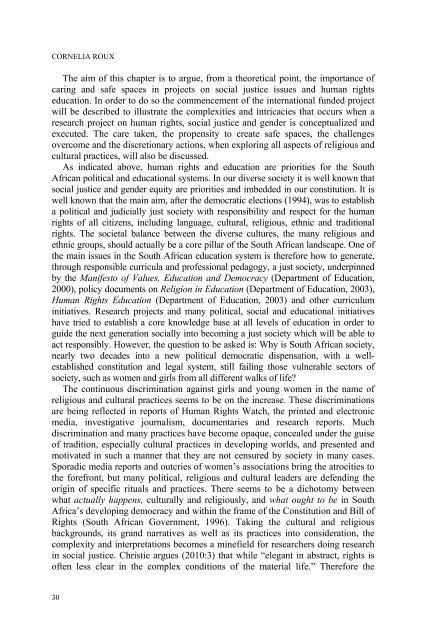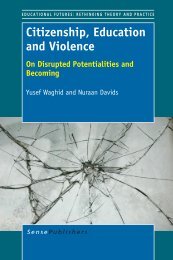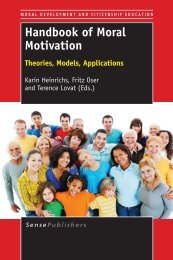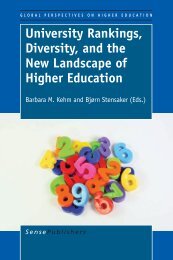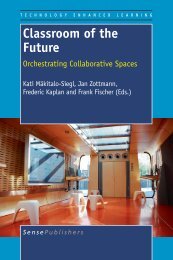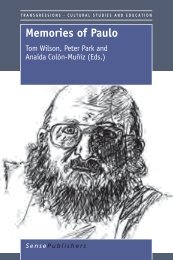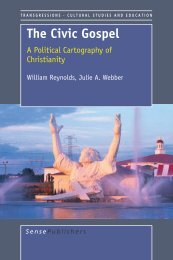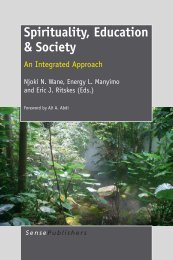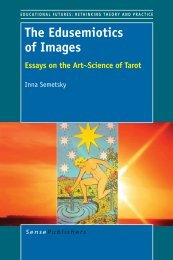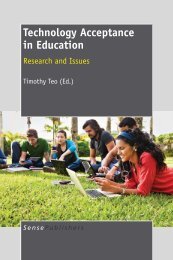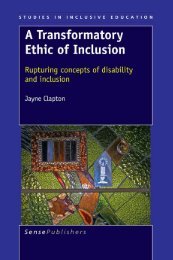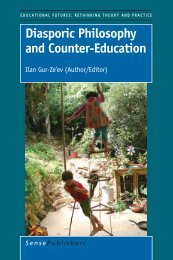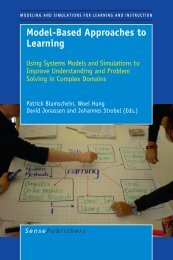Safe Spaces Human Rights Education in Diverse Contexts
Safe Spaces Human Rights Education in Diverse Contexts
Safe Spaces Human Rights Education in Diverse Contexts
You also want an ePaper? Increase the reach of your titles
YUMPU automatically turns print PDFs into web optimized ePapers that Google loves.
CORNELIA ROUX<br />
The aim of this chapter is to argue, from a theoretical po<strong>in</strong>t, the importance of<br />
car<strong>in</strong>g and safe spaces <strong>in</strong> projects on social justice issues and human rights<br />
education. In order to do so the commencement of the <strong>in</strong>ternational funded project<br />
will be described to illustrate the complexities and <strong>in</strong>tricacies that occurs when a<br />
research project on human rights, social justice and gender is conceptualized and<br />
executed. The care taken, the propensity to create safe spaces, the challenges<br />
overcome and the discretionary actions, when explor<strong>in</strong>g all aspects of religious and<br />
cultural practices, will also be discussed.<br />
As <strong>in</strong>dicated above, human rights and education are priorities for the South<br />
African political and educational systems. In our diverse society it is well known that<br />
social justice and gender equity are priorities and imbedded <strong>in</strong> our constitution. It is<br />
well known that the ma<strong>in</strong> aim, after the democratic elections (1994), was to establish<br />
a political and judicially just society with responsibility and respect for the human<br />
rights of all citizens, <strong>in</strong>clud<strong>in</strong>g language, cultural, religious, ethnic and traditional<br />
rights. The societal balance between the diverse cultures, the many religious and<br />
ethnic groups, should actually be a core pillar of the South African landscape. One of<br />
the ma<strong>in</strong> issues <strong>in</strong> the South African education system is therefore how to generate,<br />
through responsible curricula and professional pedagogy, a just society, underp<strong>in</strong>ned<br />
by the Manifesto of Values, <strong>Education</strong> and Democracy (Department of <strong>Education</strong>,<br />
2000), policy documents on Religion <strong>in</strong> <strong>Education</strong> (Department of <strong>Education</strong>, 2003),<br />
<strong>Human</strong> <strong>Rights</strong> <strong>Education</strong> (Department of <strong>Education</strong>, 2003) and other curriculum<br />
<strong>in</strong>itiatives. Research projects and many political, social and educational <strong>in</strong>itiatives<br />
have tried to establish a core knowledge base at all levels of education <strong>in</strong> order to<br />
guide the next generation socially <strong>in</strong>to becom<strong>in</strong>g a just society which will be able to<br />
act responsibly. However, the question to be asked is: Why is South African society,<br />
nearly two decades <strong>in</strong>to a new political democratic dispensation, with a wellestablished<br />
constitution and legal system, still fail<strong>in</strong>g those vulnerable sectors of<br />
society, such as women and girls from all different walks of life?<br />
The cont<strong>in</strong>uous discrim<strong>in</strong>ation aga<strong>in</strong>st girls and young women <strong>in</strong> the name of<br />
religious and cultural practices seems to be on the <strong>in</strong>crease. These discrim<strong>in</strong>ations<br />
are be<strong>in</strong>g reflected <strong>in</strong> reports of <strong>Human</strong> <strong>Rights</strong> Watch, the pr<strong>in</strong>ted and electronic<br />
media, <strong>in</strong>vestigative journalism, documentaries and research reports. Much<br />
discrim<strong>in</strong>ation and many practices have become opaque, concealed under the guise<br />
of tradition, especially cultural practices <strong>in</strong> develop<strong>in</strong>g worlds, and presented and<br />
motivated <strong>in</strong> such a manner that they are not censured by society <strong>in</strong> many cases.<br />
Sporadic media reports and outcries of women’s associations br<strong>in</strong>g the atrocities to<br />
the forefront, but many political, religious and cultural leaders are defend<strong>in</strong>g the<br />
orig<strong>in</strong> of specific rituals and practices. There seems to be a dichotomy between<br />
what actually happens, culturally and religiously, and what ought to be <strong>in</strong> South<br />
Africa’s develop<strong>in</strong>g democracy and with<strong>in</strong> the frame of the Constitution and Bill of<br />
<strong>Rights</strong> (South African Government, 1996). Tak<strong>in</strong>g the cultural and religious<br />
backgrounds, its grand narratives as well as its practices <strong>in</strong>to consideration, the<br />
complexity and <strong>in</strong>terpretations becomes a m<strong>in</strong>efield for researchers do<strong>in</strong>g research<br />
<strong>in</strong> social justice. Christie argues (2010:3) that while “elegant <strong>in</strong> abstract, rights is<br />
often less clear <strong>in</strong> the complex conditions of the material life.” Therefore the<br />
30


